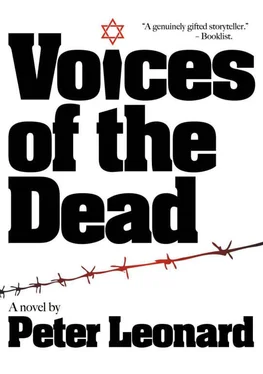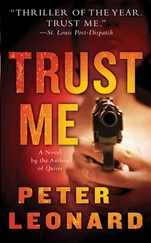She was thinking back on her life: escaping from the mass grave in the woods outside Dachau, taken in by the Muellers, the farm couple who had risked their lives for a Jewish girl, fed and protected her until the end of the war. Joyce’s aunt Sima and uncle Stanley had sent her a visa and money for passage to New York and invited her to live with them in Baltimore. Joyce didn’t have anyone else. She was twenty-one. Stan owned a real-estate company and offered her a job.
Four years later she met Mitch. Life couldn’t have been much better. He was smart and good-looking, had just graduated dental school. He was, as Joyce’s aunt had said, a catch. They got married. Mitch bought into a practice with five other dentists, specializing in root canals. That’s all they did. He talked about swollen gums and abscessed teeth and dead roots at the dinner table, eyes lit up with excitement.
He made a good living and Joyce didn’t do badly herself. With two incomes they were able to afford the house in Georgetown. They were married eighteen years when Mitch started fooling around. It was obvious something was going on. He started exercising for the first time in his life, lost weight, bought new clothes, and spent more time grooming and more time away from home.
Joyce thought it was a phase, a midlife crisis, something he would get out of his system. But there were others. How many she didn’t know. The final straw was when she found out Mitch was paying for an apartment for Sherri, a girl in his office. That was it, she moved out, filed for divorce, walked with half their assets, $350,000, her freedom, and, maybe best of all, she didn’t have to hear about dental procedures any more.
Joyce moved to Palm Beach and bought a fifth-floor, two-bedroom condo at the Winthrop House, with views of the ocean and the orange tile rooftops of the trendy shopping district. She applied for a job at Sunset Realty, and got it, but put off her start date for a week so she could take her niece, Jenni, to Munich. Joyce hadn’t been back since the war.
They were having a wonderful girls’ day, shopping all morning, walking along Leopoldstrasse when she saw him coming out of a restaurant. Recognized him, mind racing, trying to remember when, and pictured him wearing a gray SS uniform, holding a riding crop in gloved hands. Joyce approached him and said, “I know you.”
He glanced at her and smiled, thinking she was an old friend.
“You’re the Nazi from Dachau, the murderer.”
He frowned now, moving away from her, signaled a taxi. She dropped her shopping bags and went after him. “Stop him, he’s a murderer.” People on the sidewalk were looking at her like she was crazy, keeping their distance.
Jenni picked up the bags and followed her, surprised, embarrassed, Joyce could tell, by her outburst.
“Aunt Joyce, what’s going on?” Jenni looking at her like she’d flipped.
“It’s the Nazi murderer from Dachau.”
“That was thirty years ago,” Jenni said. “How can you be sure?”
Jenni called her friend Adele‚ who worked at the Anti-Defamation League in New York, explained what had happened. Adele suggested they contact the ZOB in Munich. Joyce called and talked to a woman named Lisa Martz, and arranged to stop by their office the next morning, to look through archival photographs of Dachau Nazis.
Joyce was calmer, more relaxed after that. She and Jenni went back to their hotel, napped and went out to dinner. When they returned to the room there was a swastika painted on the wall, their clothes were all over the floor. Joyce freaked. She wasn’t going to go through that again, called the airline and they flew out that night.
Three weeks later Mitch, her ex, and Sherri, his fiancée, were murdered. A Washington DC detective named Taggart had flown down to question her. He was a nice-looking dark-haired guy, although she couldn’t say much for his taste in clothes. He wore a green dress shirt and a brown plaid sport coat.
“Nice view,” he said, looking out the window at the ocean, Virginia twang in his voice.
“That’s why I bought it.”
“What’s a place like this run, you don’t mind my asking?”
She told him and he whistled hearing the amount.
“You want to sit down, Detective?” She was in one of the blue Baker Regency chairs. He crossed the living room and sat on the couch.
“Get back to DC very often?”
“I flew up for the funeral.” She had paid her respects to Pitsy and Jarvis, Mitch’s parents, and joined them for shiva.
“How about before that?” Taggart said.
“The day I moved.”
“How’d you feel when you found out your husband was having an affair?”
“Which time?”
“How many were there?”
“I don’t know for sure. Three or four, at least.”
“How do you know?”
Joyce said, “You married, Detective?”
“Uh-huh.”
“Ever have an affair?”
“We’re not talking about me,” Taggart said, getting defensive.
“When a guy has an affair things about him change. I knew what Mitch was doing.”
“Did you know Ms. Shore?”
“She worked in Mitch’s office,” Joyce said. “I saw her occasionally. We weren’t friends if that’s what you mean.”
“How’d you find out about it?”
“He rented her an apartment. The bill came to the house. Dumb, huh?”
“Were you angry?”
“No, I was relieved. I’d had enough. I said, you want her go right ahead. I’m leaving. You know when your marriage isn’t working, don’t you?”
“Do you own a gun?”
“I don’t believe in guns.”
“Did you kill your husband?”
She looked him in the eye and said, “No.”
“You know who did?”
Joyce shook her head.
She escorted him to the door, sure he was going to ask another question like Columbo always did, Peter Falk looking scruffy and disheveled. But Taggart wasn’t Columbo. He walked out. She closed the door and stood on the balcony, watched him come out of the building and get in a car and drive north on South Ocean Boulevard.
Hess was wearing the new yellow golf shirt, khakis, sunglasses and the Breakers cap. He had parked on the side of the road and stood at the gate, studying the house and grounds of the estate. According to the description in the brochure it was Mission-style, 12,150 square feet, eight bedrooms, movie theater, bowling alley, private beach and beach house across South Ocean Boulevard, circular drive made out of stone to match the color of the tile roof.
A white Cadillac approached, the gate opened. The driver waved. The Cadillac drove in, parking on the circular drive. Hess pulled in behind her.
She stepped out and came toward him, a blonde Jew, fifties, Dachau thin, heavy make-up, an excessive amount of jewelry.
“Mr. Landau, I’m Lenore Deutsch.”
She had a New York accent and offered a cold bejeweled hand. Hess shook it.
“I understand you’re from Atlanta. What part? Wait. Don’t tell me. Let me guess. Sandy Springs. Am I right?” She smiled.
“How did you know?” Hess said. He could see the dark roots of her hair under the dyed blonde, and evidence of plastic surgery, skin tight across her face, and lips that curled up like a duck’s.
“I assumed you were from Fulton County. I sold an oceanfront property to the Watt family not too long ago. Do you by any chance know Mr. Josh Watt? He’s a major developer.”
Hess was already tired of listening to her.
“You’re without question an astute and savvy buyer, Mr. Landau. There is only so much ocean frontage. And Palm Beach, as a one-of-a-kind enclave, will never lose its luster.” She paused. “Now would you like to tour the estate?”
Her onslaught of words was exhausting. “What happened to Mrs. Cantor?”
Читать дальше












